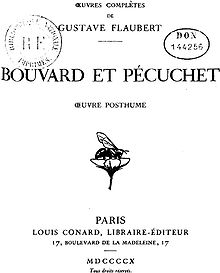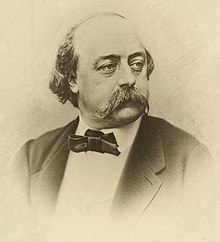Bouvard and Pécuchet
Bouvard and Pécuchet (French original title: Bouvard et Pécuchet ) is an unfinished satirical picaresque novel by Gustave Flaubert . It was published in 1881, a year after Flaubert's death.
Flaubert conceived the novel as early as 1863, but did not begin to write it until August 1874. Over time, he became so obsessed with working on the book that he claimed to have read over 1,500 books in preparation for its writing. He himself referred to it as his masterpiece that surpassed all of his other works.
content
The novel describes the adventures of the two Parisian office workers ( copyists ) François Denys Bartholomée Bouvard and Cyrille Romain Juste Pécuchet. They are of the same age and almost identical in nature. They met on a hot summer's day in 1838 and immediately formed a symbiotic friendship. When Bouvard inherits a sizable fortune, the two decide to settle in the country. You will find a plot of land near the town of Chavignolles, between Caen and Falaise in the Calvados department in Normandy. The search for intellectual stimulation leads them through almost all branches of knowledge over the years.
Flaubert exposes his title characters to the treacherous pitfalls and adversities of the sciences and arts; every project that Bouvard and Pécuchet begin fails. Since they never stick to one topic after their failures and disappointments, but always dedicate themselves to new projects, they constantly remain at the level of amateur beginners. Their efforts lead to a deterioration in their relationship with the villagers.
According to Flaubert's posthumous notes, the villagers are angry about Bouvard and Pécuchet's antics and try to drive the couple out of the area. Disgusted by the world in general, Bouvard and Pécuchet ultimately return to “copying as before ” ( copier comme autrefois) ; they stop their intellectual endeavors. The work ends with the diligent preparation for the production of a double desk that they want to write together at.
shape
In each chapter, the activities of the title characters are assigned to specific subject areas. This gives the work an episodic plot structure. Again and again, the political changes that capture France during the narrated period (which extends from 1839 to the time of the Second Empire ) are thematized and are in part also the subject of the plot, especially in the seventh chapter, in which the turmoil of the February Revolution of 1848 sweep over the otherwise sleepy Chavignolles.
| chapter | subjects |
|---|---|
| 1. | Meeting, friendship, Bouvard's legacy |
| 2. | Agriculture, horticulture and landscaping, food preservation, distillery |
| 3. | Natural sciences, chemistry, anatomy, medicine, biology, geology |
| 4th | Archeology, history, architecture |
| 5. | Literature, drama, grammar, aesthetics |
| 6th | politics |
| 7th | love |
| 8th. | Gymnastics, philosophy |
| 9. | religion |
| 10. | Pedagogy, social reforms |
filming
- “Bouvard et Pécuchet”, directed by Jean-Daniel Verhaeghe , 1989.
Settings
- 1952: Blinder Eifer - Cumbersome painting of stupidity, radio play adaptation: Henri Regnier , director: Raoul Wolfgang Schnell , production: NWDR Cologne
- 1976: Bouvard and Pécuchet, radio play adaptation: Gisela Elsner , director: Fritz Schröder-Jahn , production: NDR
- 1994: Bouvard and Pécuchet, radio play adaptation: Thomas Fritz , director: Jörg Jannings , production: DeutschlandRadio Berlin , co-production: SWF
- 2000: Ingomar von Kieseritzky : Bouvard and Pécuchet look back or Die Exhaustion, Director: Dieter Carls , Production: WDR (continuation of the novel with the main characters as pensioners)
Adaptation for the theater
- 1994 Idiots , stage adaptation of the novel: Hannelore Honnen ; World premiere at Theater am Sachsenring , Cologne , director: Joe Knipp (Honnen's stage adaptation in the production by Knipp was nominated for the Cologne Theater Prize 1994)
literature
Text output
- Translated by Ernst Wilhelm Fischer, Kiepenheuer, Potsdam 1922
- Translated by Georg Goyert , Rauch, Düsseldorf 1957
- Translated by Erich Marx, Dieterich, Leipzig 1959
- Translated by Thomas Dobberkau, Rütten & Loening, Berlin 1980
- Translated by Hans-Horst Henschen , Eichborn, Frankfurt am Main 2003, The Other Library ISBN 3-8218-4536-8
- Translated from Caroline Vollmann, Zweiausendeins, Frankfurt am Main 2004 ISBN 3-86150-534-7
- Translated by Erich Wolfgang Skwara , Insel, Berlin 2010 ISBN 978-3-458-17431-8
- Dramatic editing
- Gerda Scheffel : Bouvard and Pécuchet or An Encyclopedia of Human Stupidity. Publishing house of the authors, Frankfurt 1973
Secondary literature
- Monika Bias: Bouvard et Pécuchet, an aporetic provocation of autonomous reason. Dissertation, Erlangen, Nuremberg 1985.
- Manfred Hardt : Flaubert's late work - studies on “Bouvard et Pécuchet”. Klostermann, Frankfurt a. M. 1970.
- Claudia Neuenschwander-Naef: Imagination and reality in Flaubert's “Bouvard et Pécuchet”. Verlag Keller, Winterthur 1959.
- Dietrich Scholler: move to Encyclopaedia. For the narrative staging of knowledge in Flaubert's “Bouvard et Pécuchet”. (= Romanice; 19). Weidler, Berlin 2002, ISBN 3-89693-719-7 .
- Christian von Tschilschke : Epics of the Trivial. NV Gogols “The Dead Souls” and G. Flaubert's “Bouvard and Pécuchet”. A structural and thematic comparison. (= New forum for general and comparative literary studies; 1). Winter, Heidelberg 1996, ISBN 3-8253-0389-6 .
Web links
- Gustave Flaubert: Bouvard et Pécuchet in Project Gutenberg ( currently not available to users from Germany ) (in French)
- Literature by and about Bouvard and Pécuchet in the catalog of the German National Library
- Flaubert website of the University of Rouen
notes
- ^ Based on the stage version for the Teatro Stabile, Genoa, by Luigi Squarzina, Tullio Kezich; with the assistance of Guido Honder. Typescript, theater manuscript



